#race relations
Text
the people who think james and hbomberguy's whiteness do not matter in this context are just telling how little they know of the workings of race and white privilege in the world. If it didn't matter, that man wouldn't have gotten away with his plagiarism for so long, and creators of color wouldn't have been afraid to speak up against him. Claiming that "race has nothing to do with it" is at best ignorant and at worst malicious, if you go to any environment of cultural production you will find piles of cases of white creators/scholars/whatever failing to give credit to their racialized peers, and a lot of those times these plagiarism cases go hand in hand with other instances of racism. Sorry you get uncomfortable by being made to acknowledge your own privilege, but we're GONNA talk about race in EVERY conversation. SPECIALLY when it involves creation and cultural production.
#hbomberguy#james somerton#plagiarims#racism#race relations#racism in online spaces#racism in fandoms
518 notes
·
View notes
Text
i learned that from the 1990s through 2021 the NFL used a method called "race-norming", which assumed Black players started out with lower cognitive function, as part of a dementia test to determine payouts in brain injury settlements (x)

155 notes
·
View notes
Text
honestly the way season 3 of doctor who dealt with race was ridiculous.
first of all, you're telling me this black family didn't have anything to say with the fact that their father had ran off with a younger white woman who he was spending all their 'inheritance' on? ever have martha address how this might have impacted her? maybe in how she views romantic relationships? how she is stuck in the middle? how annalise belittles her and only her mum really sticks up for her and her father doesn't?
let alone the show having the 'doctor' choose joan, the white racially prejudiced woman in the series where the black girl is in love with the white lead, and have a gag that he only goes for blondes; newflash, that translates to white. let alone give that black character any black romances in her series. the people who hit on her all season are all white; the doctor, shakespeare, riley, captain jack and tom. then to slap her character with the only other black character in the show was laughable. i don't care if their relationship was supposed to develop in torchwood, it never happened so they should have scrapped it. it was tacky af.
or have martha ever talk about the prejudice and stereotypes she would have had to deal with as a training medical student? medical racism in the nhs is very much a thing. we're still having to break racist ideas that black people don't face the pain the same way white people do in 2022.
then the shakespeare code? the doctor's stupid wide eyed innocent reaction to martha asking him if she was safe? first of all, why on earth did the doctor react that way to someone asking him if they are safe. almost every companion he has ever taken he got to know under extremely dangerous circumstances. so yeah they're gonna ask if they're safe. and when martha specifies her race, you have this 900 and something year old genius timelord just say to walk around like you own the place and point at the two black background talent in front of them to make it okay. i am well aware that slavery was not recognised as legal in london at the time but if you think those people weren't racist you're an idiot.
moreover, you have martha be surprised at the way shakespeare addresses her? "i can't believe i'm hearing this" - WHY. why tf would she be surprised given you had literally JUST had her voice her opinion about race? and have the doctor respond that it's 'political correctness gone mad?' are you serious?! ESPECIALLY considering shakespeare referred to her as a 'blackamoor' and only two years prior in history the queen had ordered for the expulsion and removal of them from london? there were many black servants working in london and the queen literally sent letters to 'masters' in london to transport them away to SELL THEM. so martha's claim was 100% valid. and even if historians debate whether or not these letters were ever sent, it confirms massive racial prejudice that was definitely not all in our heads. and we see firsthand the 'othering' of martha.
then you bring martha to 1930S NEW YORK. and racism is NEVER addressed because you threw in hugh quarshie?! because racism magically disappeared during the great depression? trying to push that the great depression made everyone realise they were in the same boat? bullshit! america was still under jim crow and racially segregated! black people were still getting lynched in america! the wall street crash only made race relations worse!!! the doctor has willingly taken martha to a dangerous era for her TWICE. something that may have been okay if we knew he took it seriously but for some reason the show makes him brush it off, making him seem like an asshole. the episode was five years off the harlem riots! new york was the epicentre of jim crow! race relations were at an all time low during the great depression. and the show conveniently ignores that.
then you get 1913. the only episodes that actually show racism for some reason. i still don't know whether or not the doctor or the tardis intentionally chose this era, i don't think he did but to never hold joan or john accountable for their actions towards martha? to practically reward joan by giving her narrative sympathy and have the doctor actively try to get her to travel with him? despite her being an explicit racist?
then martha gets stuck in the past AGAIN this time in 1969? poc who have lived in the uk for decades have repeatedly talked of how they would still encounter racism despite the race relations act of 1968. being refused service. refused goods. human decency. and you explicitly have martha work to support the doctor and make it a joke, like she's nagging him? knowing how much racism martha would have had to encounter to get the shop? note martha is having to work in a shop anyway. not to mention again their presentation as a mixed couple living together? less than 2% were married in the uk. and them just being together period still would have been a thing. not to mention the national front had been founded already and enoch powells 'rivers of blood' speech.
then the master enslaves the jones? show them being roughed up by police? this is the second time the show has had black characters forcibly subservient to white counterparts - first with martha, then with the jones family. maid outfits and all.
and you don't even address the doctor x martha pairing at all. only a couple years prior to the season being released the uk aired that racist episode of wife swap, exposing just how much people loathed the idea of interracial dating and how much racism was steeped in britain still. the closest the show ever got to addressing that was playing "sunshine" by arrested development in the first episode, a song about interracial love.
and i haven't even mentioned the implications of making the first black female companion in the show's history constantly and negatively compared the previous show's white romantic lead, and the show having the lead character uphold this sentiment and actively perpetuate this? giving the racist fans ammo and justification? with little to no repercussions due to the next season being so focused on being the grande finale that the show never has time to address it? so martha gets sandwiched in the middle and forgotten by the time of the christmas special?
the blatant disregard towards the black characters, particularly martha and general lack of any sort of historical research in series 3 is terrible.
#doctor who#martha jones#annalise#dw criticism#racism#race relations#black history#black british history#russell t davies#rtd era#series 3#doctor who series 3#leo jones#tish jones#francine jones#joan redfern#rose tyler#mickey smith#the master#human nature#the family of blood#evolution of the daleks#daleks in manhattan#blink#steven moffat#last of the timelords#the sound of drums#captain jack harkness#thomas milligan#tom milligan
429 notes
·
View notes
Audio
Listen/purchase: Water Fountains by Highway 80 Stories
During Mike Broussard’s early childhood, his family lived in Shreveport, Louisiana, but later he moved to Vivian where he owned a business and lived out the remainder of his life. The experience described in this song, when Mike was twelve years old, affected his attitude towards race relations from then on.
One of the oldest movie theaters in Shreveport was The Strand. It had different entrances for blacks and whites and water fountains marked for the different races, as well.
During the ’60s, most southern cities had two simultaneous phenomena: demographically a significant percentage of the population was African-American (Shreveport was about 60% black) and as a consequence whites and blacks unofficially interacted a lot. The other aspect was a policy of official segregation. This manifested itself in a myriad of ways beyond the obvious, e.g. separate drinking fountains and different entrances to movie theaters. However, relationships between whites and blacks could be warm and friendly despite official segregation.
Into the demographic mix were other ingredients. Louisiana had a relatively large number of Italian Americans, mostly Sicilians. These immigrants also experienced some discrimination, and in general did not share the otherwise pervasive white attitudes about African-Americans.
When Mike Broussard served in Vietnam he met an African-American from Detroit, D.W. Washington, and they became life-long friends. Mike and D.W. talked about their plans when their tours were over, and D.W. went back to Vivian with Mike and they operated a filling station and auto repair shop for more than forty years. D.W. was Mike’s closest friend.
© 2019 Frank David Leone, Jr./Highway 80 Music (ASCAP). The songs and stories on the Highway 80 Stories website are works of fiction. Names, characters, businesses, places, events, locales, and incidents are either the products of the author’s imagination or used in a fictitious manner. Any resemblance to actual persons, living or dead, or actual events is purely coincidental.
#bandcamp#literature#southern fiction#short stories#20th century history#the 1960s#race relations#coming of age#Shreveport#Louisiana
31 notes
·
View notes
Text

________________________________
"To say 'I don’t see race' in a country where race was the metric for humanity is to functionally state 'I choose not to see injustice.'"
tori williams douglass
304 notes
·
View notes
Text

🤔
#race#race relations#identity politics#blm#barack obama#obama#us#usa#united states#politics#blacklivesmatter#gallup#2013#2014#liberal#liberals#democrat#democrats#democratic party#progressivism#progressive
45 notes
·
View notes
Text

The white privilege thing doesn't seem that great when you stop comparing white people with just the worst performers
10 notes
·
View notes
Text

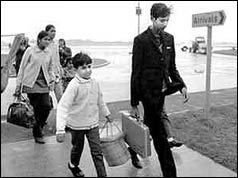
On 18th September 1972, BBC News reported that the first 193 Ugandan refugees, fleeing persecution by the country’s military dictatorship, had arrived at Stansted Airport, Essex. Over half of the arrivals had British passports, and housing and immediate needs would be overseen by the Ugandan Resettlement Board.
Uganda’s Asian community, numbering around 55 000, many of whom ran family businesses and small enterprise, were ordered in August 1972 to leave the country within 90 days by President Idi Amin. Amin had publicly denounced Ugandan Asians as ‘bloodsuckers’, threatening that any who had not left by the arbitrary deadline of November 8th would be interned in military detention camps.
Many of the initial flight of refugees had endured frightening experiences prior to their departure from Uganda, at the hands of Amin’s troops. "On the way to the airport the coach was stopped by troops seven times, and we were all held at gun point," one refugee told reporters. Another stated that he had been robbed of personal valuables and Ugandan currency on the way to Entebbe airport.
News reports at the time cited some opposition within the UK over the acceptance of the Ugandan Asians. The Leicester local authority mounted a newspaper campaign urging refugees not to come to their region seeking jobs and housing. The BBC asserted that, in hindsight, the resettlement programme was seen as ‘a success story for British Immigration’.
The loss of the hardworking and successful Ugandan Asian community devastated Uganda’s agriculture, manufacturing and commerce. Idi Amin was deposed in 1979 and died in Jeddah in 2003, having been responsible for the deaths of as many as 300 000 Ugandan civilians during his reign of terror as President. In 1991, Ugandan President Yoweri Museveni invited the expelled community to return home to help rebuild the economy.
The Wilson Labour government also had to grapple with a refugee crisis from a former African colony.
In February 1968, BBC news reported;
"…Another 96 Indians and Pakistanis from Kenya have arrived in Britain, the latest in a growing exodus of Kenyan Asians fleeing from laws which prevent them making a living…"
Many Asian people living in Kenya had not taken up Kenyan citizenship following the country’s independence from Britain in 1963, but possessed British passports. Under Kenya’s Africanisation policy, non-citizens required work permits, and were being removed from employment in favour of Kenyan nationals. There was growing public demand for laws to prevent non-citizens from owning businesses or even operating as street and market traders. As a result, British passport holders were leaving Kenya at the rate of 1000 per month, leaving a huge deficit in skills and experience within the business community and civil service.
Fearing a backlash over the large numbers of Asian immigrants, Home Secretary, and future Prime Minister, James Callaghan, rushed through the Commonwealth Immigration Act, which made it a requirement that prospective immigrants must have a 'close connection' with Britain.
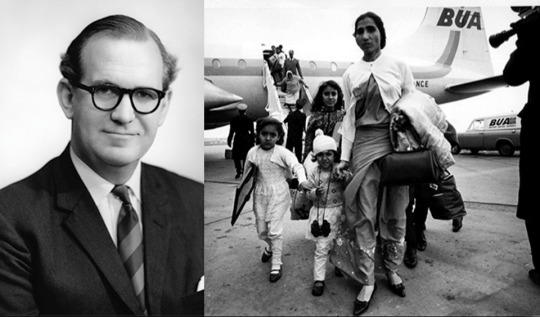
This led to disagreement in Cabinet, with Secretary of State for Commonwealth Affairs, George Thomson (1921-2008) arguing;
"…To pass such legislation would be wrong in principle, clearly discrimination on the grounds of colour, and contrary to everything we stand for…"
In 1971, the Heath government made further legislative changes that would mean that (some) immigrants from Commonwealth countries would be treated no more favourably than those from the rest of the world, and that tightened restrictions on those who stayed by linking work permits to a specific job and location, requiring registration with police, and reapplication to stay in Britain each 12 months.
The Patrial Right of Abode lifted all restrictions on those immigrants with a direct ancestral connection with Britain.

Home Secretary Reginald Maudling (later famous for being smacked in the face by Irish MP Bernadette Devlin, and for having to resign over a corruption scandal linked with disgraced property developer John Poulson) denied that this was, in effect, a 'colour bar', telling the BBC;
"…Of course they are more likely to be white because we have on the whole more whites than coloureds in this country, but there is no colour bar involved…"
Unsurprisingly, not everyone was convinced.
Vishna Sharma, Executive Secretary of the Joint Council for the Welfare of Immigrants, described the bill to BBC News as, "basically racially discriminatory, repressive and divisive," and added, "It will create divisions amongst the Commonwealth citizens already living in this country on patrial and non-patrial basis. It will create day-to-day bureaucracy and interference on people living in this country. It will create more hardship for people wanting to enter into this country."
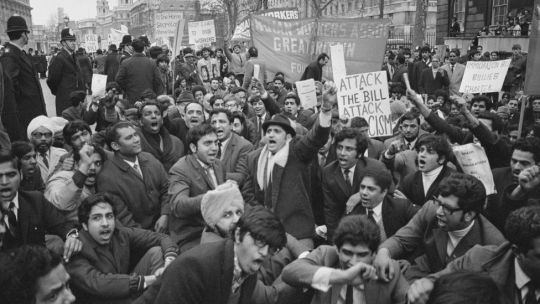
(Source; BBC reporting and history.com. Photo Credits; BBC News)
#social history#uk politics#working class history#social justice#uk government#human rights#uk history#british culture#society#history#race relations#immigration
26 notes
·
View notes
Text
youtube
Coleman Hughes on the Politics of Race | Real Time with Bill Maher
Bill Maher: So, what's the difference, where do we draw the line here? Fighting racism and your book is fighting the politics of ra-- -Talking about the politics.
Coleman Hughes: Right.
Maher: What's the difference between fighting racism and the politics of racism?
Hughes: Right. So, racism as defined by Martin Luther King, the Civil Rights Movement, judging people on the basis of their race, rather than their character and so forth. That's not what my book is-- is against, uh, fighting. Obviously, we should all fight that. No matter who it's directed at.
What my book is fighting is this ideology that really was born with critical race theory, the adult version of critical race theory in the '70s and '80s and became more popular over the past ten years. That equates Whiteness with evil, equates Blackness with a kind of moral superiority. Stereotypes whole groups of people, says that your race is an essential part of who you are and feels even that children need to be taught this from as young an age as possible because they're-- they're born with the wrong attitude about race and it needs to be sort of hammered out of them, by separating White kids from Black kids, from Hispanic kids. Putting them in different corners of the room, as was done in my Columbia University orientation, some nine years ago. And that the way we're going to get to, you know, the kind of society we want is by focusing more and more on racial identity.
In my book I say, this is nonsense, this is totally against the spirit of-- of the Civil Rights Movement and that actually, the wise principle is that we should try to treat people without regard to race both in our personal lives and in public policy.
Maher: Funny, I mean… that wouldn't have been controversial with any liberal, 30 or 40, 50 years ago. I mean, that is what Martin Luther King said. What-- what color blind society, I mean, I thought we were all after that and then we all weren't, and what changed?
Hughes: Yeah, so, even 20 years ago, it wouldn't have been controversial. I grew up in a liberal town, Montclair, New Jersey, many people probably know it. Diverse town, where, you know, we celebrated Martin Luther King every year, we listened to the famous speech and got goosebumps, as most Americans do and really believed that, uh, and I lived out that dream, in other words, I had friends of every race as a kid and I didn't think of them as belonging to a race, I thought of them by their name and their attributes, right? Around--
Maher: They treated the same way?
Hughes: Yeah. For the most part. Yeah, I mean, there are exceptions, but the exceptions prove the overwhelming rule. So, you know before 2013, you can just look at polling data from Gallup and Pew. The majority of Americans, Black, White and Hispanic believed race relations were good, as late as 2013. And that's the year everything takes a nosedive, so that by 2021, half as many people thought we were in a good place, as thought that in 2013.
So, the question is what happened? Did racism suddenly spike? Well, no, the data is pretty clear on that, racism didn't spike, what happened is that, we all got smartphones and social media, and started seeing unrepresentative video clips of cops, you know, harassing or beating or killing Black Americans and this gave people the misperception that racism was suddenly this widespread problem and it touched off all of these trends that we've now heard about for the past eight years, under various names, wokeness, CRT, DEI, it's all fundamentally from that core change and how information is being shared.
Maher: But there was part of that was good, that we did see these beatings and things go on, because that's what changed it.
Hughes: The one thing I can say is good about it, is before the Black Lives Matter movement in 2013, cops could basically do whatever and not get punished.
Maher: Right.
Hughes: You could, I mean-- it's hard to find even a single example. Uh, you can find isolated ones but mostly cops got away with whatever. So, that's no longer the case and that's the one thing I could credit.
Maher: And they go to jail.
Hughes: Yeah. I mean it-- But on the other hand, it has not-- many people think it just revealed all the racism that's actually out there, that's not true, because if that were true, people would have an accurate assessment, and this has been tested. When you ask very liberal Americans, "How many unarmed Black people do you think are shot by the cops every year?" The answer they gave in 2019 was a thousand, the real number from that year was 12. So, this social media algorithmically boosted content has-- it's not educating us, it's miseducating us.
--

#Coleman Hughes#Bill Maher#Real Time with Bill Maher#race relations#racism#antiracism#antiracism as religion#critical race theory#woke#wokeness#cult of woke#wokeism#wokeness as religion#social media#religion is a mental illness
6 notes
·
View notes
Text


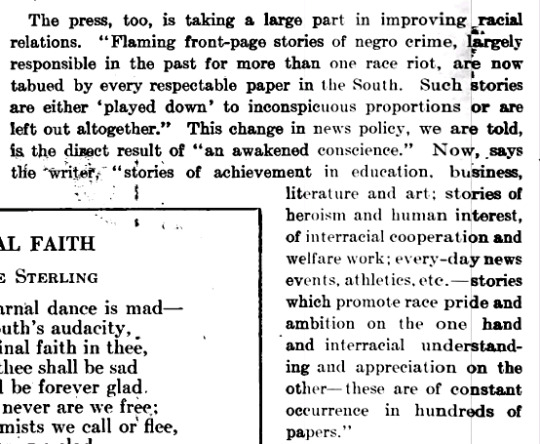
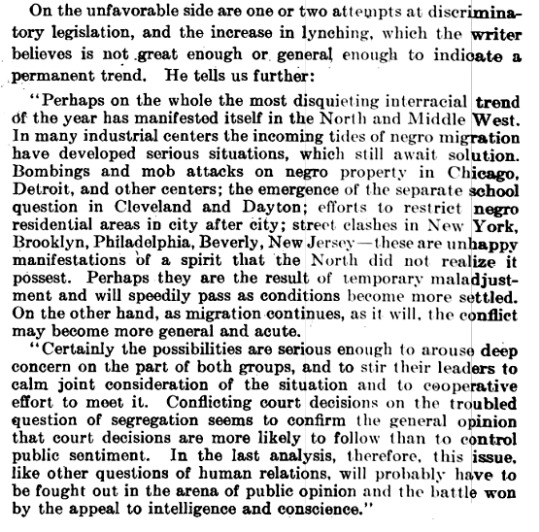
LITERARY DIGEST, February 12, 1927
7 notes
·
View notes
Text
The Landlord, 1970. x
#the landlord#black films#black power#anti white supremacy#black is beautiful#1970s#1970s films#race relations
3 notes
·
View notes
Text
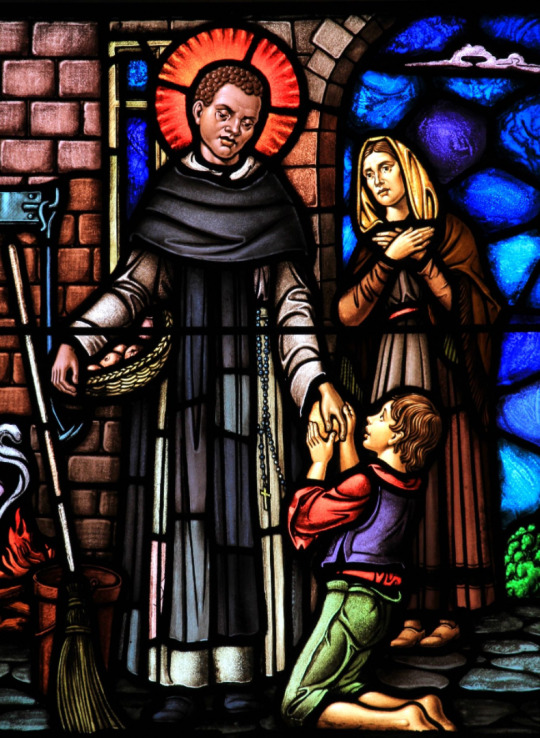
THE DESCRIPTION OF SAINT MARTIN DE PORRES
The Patron of Barbers (and Hairstylists), Race Relations and Social Justice
Feast Day: November 3
"Do not complain, that shows discontent with the will of God in the present moment. That is also proof of impatience."
Martin de Porres was born in Lima, Peru, on December 9, 1579 to Don Juan de Porras y de la Peña, a Spanish nobleman and adventurer, and Ana Velázquez, a freed daughter of slaves from Panama. His father abandoned the family when Martin and his sister, Juana, were very young. Ana Velázquez supported her children by taking in laundry.
Martin's childhood poverty did not embitter him but made him sensitive to the plight of the poor, and especially the orphans to whom he would devote much of his time and resources. Even as a child, Martin would give the family's scarce resources to the beggars whom he saw as less fortunate than himself.
When Martin turned eight, his father had a change of heart and decided to claim his two children (publicly identified as mulatto, a term used for mixed-race children) in spite of the gossip to which it subjected him. He made sure that both were afforded a good education and had enough money for the family not to suffer hardship. At the age of twelve, Martin began an apprenticeship with a barber/surgeon named Marcel de Rivero. He proved extremely skilful at this trade and soon customers, who at first were sceptical of the young coloured boy, came to prefer and ask for him.
After leaving home, Martin took a room in the house of Ventura de Luna. Always a devoted Catholic who spent much time in church, Martin begged his landlady for some candle stubs. She was curious about his activities and one night spied on him through a keyhole and witnessed Martin in a vigil of ecstatic prayer — a practice he would continue throughout his life.
Martin often challenged his brothers on their racial attitudes. In one story, Martin came upon a group of Indians sweeping the floor under the watchful eye of one of the Dominican brothers. When told that they were cleaning to repay a meal they had received, Martin pointed out that the brother had fed some white people the previous day without forcing them to clean. After Martin's firm but gentle challenge, the brother took up the broom himself.
Martin frequently insisted on performing such hard and menial tasks as caring for the Order's horses in the evenings, even when informed that servants were available for these chores. He would argue that the servants were tired from their day's work while he, Martin, had done very little. He also extended his healing gifts — going to the servants' quarters and treating their ailments.
Martin's spiritual practices were legendary. He would often fast for extensive periods of time on bread and water. He loved all-night vigils, frequently praying by lying down as if crucified, sometimes kneeling but, miraculously, a foot or more off the floor. Equally legendary was his love of animals. He would feed and heal all animals that came into his vicinity and they understood and obeyed him.
Martin is often portrayed with mice because, according to one story, the monastery was tired of their rodent problems and decided to set traps. Martin was so distressed that he spoke to the mice and cut a deal with them that if they would leave the monastery, he would feed them at the back door of the kitchen. From that day forward, no mouse was seen in the monastery.
However, it is Martin's charity that made him the patron saint of social justice. Martin fed, sheltered and doctored hundreds of families. He also provided the requisite dowry of 4,000 pesos to enable at least 27 poor young women to marry. Last, but not least, he established the Orphanage and School of the Holy Cross, which took in boys and girls of all classes and taught them trades or homemaking skills. Over much criticism, he insisted that the school staff be well-paid so that they would give their best service.
Martin died on November 3rd, 1639 at the age of 59 in Lima. He died surrounded by his brothers and reciting the Credo, his life ending with the words 'et homo factus est (He had became man)'.
His funeral was attended by thousands of Peruvians from all walks of life who vied to get a piece of Martin's habit as a relic. These pieces of the saint's habit have been associated with innumerable miraculous cures. Martin de Porres is buried in the Convento Santo Domingo in Lima, Peru.
#random stuff#catholic#catholic saints#dominicans#order of preachers#barbers#hairstylists#race relations#social justice#lottery winners#martin de porres#martín de porres velázquez
7 notes
·
View notes
Text
Making white characters black isn't diversity
Literally the dumbest idea since chopping down the amazon rain forest.
First of all: corporations do not care about diversity or culture and depending on them for that is akin to trusting a politician.
Second: Simply color shifting a character who was originally white (little mermaid anyone?) is a slap in the face to people of color.
Why should we settle for a quick color change instead of getting new characters and unique stories centered around people of color?
Thirdly: if your argument for color washing white characters is to give children of color characters to cosplay as.... No.
Let your kids dress as whatever character they want! Let your white kids dress as Tiana, let your brown kids dress as Thor! Of course characters of color are going to be special to children, which is why we should be making new ones
Lastly: I am well fricking aware whitewashing has been a problem in media, but the solution to it is not payment in kind.
#Social justice#whitewashing#sjw#comics#movies#conservative#democrats#liberals#republicans#kids#race#race relations#race discrimination attorney austin#race swap#race change#race politics#politics#political#political correctness#PC
37 notes
·
View notes
Text
youtube
With all this talk about voice actors playing their race, I wanted to talk about a more nuanced position on the subject. There’s been different takes on this matter and I feel there’s one that’s sadly overlooked.
#voice acting#yoruichi shihouin#bleach#playing your race#anime#animation#Youtube#race relations#race in media#simple thoughts
7 notes
·
View notes
Text

#mentoring#motivatedmindset#focus#encouragesomeone#pedagogy#positivity#humanity#think more#self reflection#kindness#inspiration#believeinyourself#civility#innerstrength#motivation#common humanity#race relations#sociology#contentmatters#helping one another#still healing#critical thinker
8 notes
·
View notes
Text
The GOP appeals to the white working class not through class issues, but through racism. Because the white working class in the United States is, by and large, racist.
There's definitely a Horseshoe Effect when it comes to the racial politics between wealthy white Republicans and white working class Republicans. It's arguably their biggest common ground.
It's not that the white working class doesn't care about being underpaid and exploited for their labor. It's not that they're unaware of how much bosses and the capitalist system screw them over. On the contrary, they're quite cognizant of those issues. It's just that they are much more fearful of competing with immigrants over jobs or minorities fighting for racial equality, and they vote accordingly.
Some anecdotal evidence on my part: I'm a white woman born and raised in the South where my mom, dad, and stepdad's sides are all economically diverse but solidly Republican. I've heard pretty much every racist talking point across this large class gamut that doesn't include overt, KKK racism. A very close family member, a woman who grew up working class (and became middle class by marriage), cited the aforementioned fear of immigrants and minorities on why she voted for Trump, more than any other issue. The white working class kids I went to school with were also solidly Republican, and you bet your ass they had racist views!
There's a popular narrative that the white working class started voting Republican because the Democratic Party abandoned class issues. That narrative implies that the Republican Party has made class issues a large part of their platform, but that couldn't be further from the truth, as their embrace of Trickle Down Economics proves. Instead, the Democratic Party started emphasizing racial equality, which turned off the white working class by and large.
There's another popular but just as inaccurate narrative that the white working class are voting against their interests. From a class perspective, that's true. But once again, the white working class greatly prioritizes their racial politics over their class politics, so in reality, they actually are voting for their interests. Maintaining white supremacy - whether they want to admit it or not - interests them more than addressing wealth inequality.
As long as all of these factors hold true, the Republican Party will continue to court the white working class vote with Race Panic ad infinitum.
#my posts#text post#us politics#class politics#race relations#sociology#politics#i'm sure none of this will be controversial on tumblr dot com
5 notes
·
View notes